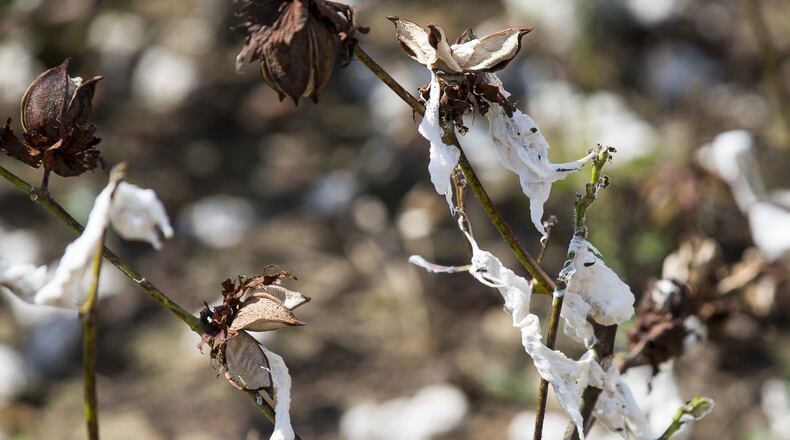Greg Calhoun spent Thursday morning clearing a path through pine trees and pieces of his neighbors' houses so he could confirm what he'd already strongly suspected: Hurricane Michael took his life's work.
The 55-year-old southwest Georgian, who had accumulated thousands of acres of crops near the Alabama border, said he and many other farmers will now have to start over. That’s if they don’t go out of business first. He sounded both amazed and desperate at the unprecedented storm and the feeling of “being in a tornado for hours.”
The damage is so widespread that Georgia Agriculture Commissioner Gary Black believes it will “definitely” be a $1 billion hit to the state’s economy. To recover, Black and farmers said the federal government must come through with assistance — and a lot of it.
Calhoun’s description of the aftermath explained why.
“There ain’t a house that ain’t got shingles tore off of it, or trees on it, or windows blown out,” said Calhoun, who lost most of his cotton and timber, as well as his great-great grandfather’s barn. “Every chicken house I’ve been by today is torn down. Power poles are snapped off. I ain’t talking about a small area – this whole area.”
Black spent Thursday on the phone with farmers like Calhoun. The more people Black talked to, the more worried he got that families lives will be changed forever by the Category 3 hurricane, which had barreled into Georgia with winds of 115 mph a day earlier.
MORE: Hurricane Michael: Damage in Georgia is ‘phenomenal’
MORE: Aerial Footage Of Hurricane Michael Damage
The most upbeat story Black heard was from a pair of brothers who had found only a third of their cotton tossed in the dirt, soggy and ruined. Others lost everything or near it. Still others can’t be reached for updates because of impassable roads and downed lines.
Black said he spoke with Vice President Mike Pence and U.S. Agriculture Secretary Sonny Perdue, who assured him the federal government would help the farmers, who reported extensive damage across South Georgia and near Macon.
The biggest crops of concern are cotton, pecans and fall vegetables, which were all in the midst of harvest and most were grown within Michael’s path. Combined, the crops are worth some $1.5 billion a year to Georgia’s economy.
Black is also worried for the state’s top commodity, poultry, because several large farms are in Grady County, where he’d heard of nothing but “utter devastation.”
The needs of the farmers could quickly become urgent in the days ahead, as no one knows when utility crews can restore power, which is a necessity for them to save what they might have left. Many will be awaiting insurance payments, but farmers and officials agree that will almost certainly not be enough to recover fully.
READ: Hurricane Michael in Georgia: Damage by the numbers
READ: VIDEO: Hurricane Michael Rips Through Southeast
READ: 'Catastrophic damage' to power grid in Georgia after Hurricane Michael
Calhoun, whose home near Bainbridge also took a blow from a massive pine, said insurance and even government loans won’t fix this — only the feds pouring money into the relief efforts will.
State Rep. Sam Watson, who grows cotton and vegetables in Colquitt County, said the damage to crops will hurt not just farmers, but their workers and communities. Watson employs up to 135 workers at harvest time and knows he can’t keep them paid now, which means they’ll likely migrate to Florida, along with all the money they typically spend with merchants in rural Georgia.
Watson was overcome at the thought of what Michael did to him and so many others.
“You work all year…,” he said, pausing a long time before finishing: “And then it’s gone.”
-For a detailed forecast, visit The Atlanta Journal-Constitution weather page.
About the Author
Keep Reading
The Latest
Featured




